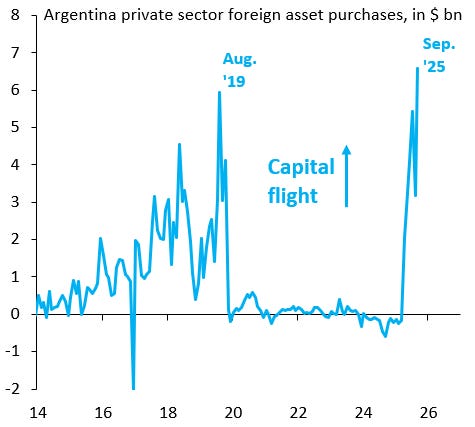The decision to stick with the Dollar peg helped Milei do well at the polls one week ago. But that decision has come at huge cost to Argentina. That’s because the Peso is substantially overvalued, which means that the uncertainty created by last weekend’s election inevitably caused massive capital flight as households scrambled to convert savings into hard currency. History shows that this capital flight never reverses. Once these savings leave the country, they’re lost to Argentina. The months leading up to last weekend’s election saw the biggest capital flight in over 20 years.
The chart above shows a proxy for monthly capital flight, which was published by Argentina’s central bank on Friday. Capital flight in September 2025 looks to have eclipsed that in August 2019, when an election spelled the end for President Macri. Two points are worth noting. First, when all is done and dusted, this capital flight episode will likely be much worse than 2019. We don’t know this for sure, since we won’t have October data for another month, but it’s highly likely. Second, had the Peso been allowed to float ahead of the election, capital flight would have stopped, because there’d no longer be a devaluation for households to front-run. Capital flight is thus a direct consequence of the decision to stick with the peg for political reasons.
There’s an obvious question how well this monthly proxy matches actual data on capital flight from the quarterly balance of payments. In the above chart, the blue line is the quarterly sum of the monthly data in the first chart. The black line is from the quarterly balance of payments and is a more accurate metric for capital flight. It sums residents’ direct investment outflows (excluding reinvested earnings), their portfolio and other investment outflows plus errors and omissions. It’s clear that the monthly capital flight proxy does a good job of capturing what’s going on.
Argentina’s almost pathological fixation on Dollar pegs is a huge distraction. It also starves the country of capital, which is the opposite of what the country needs.



